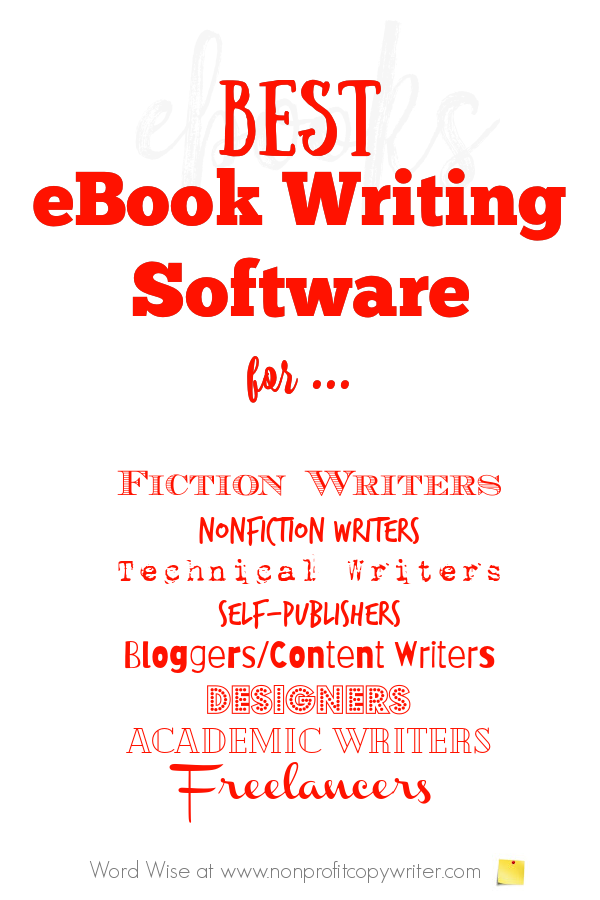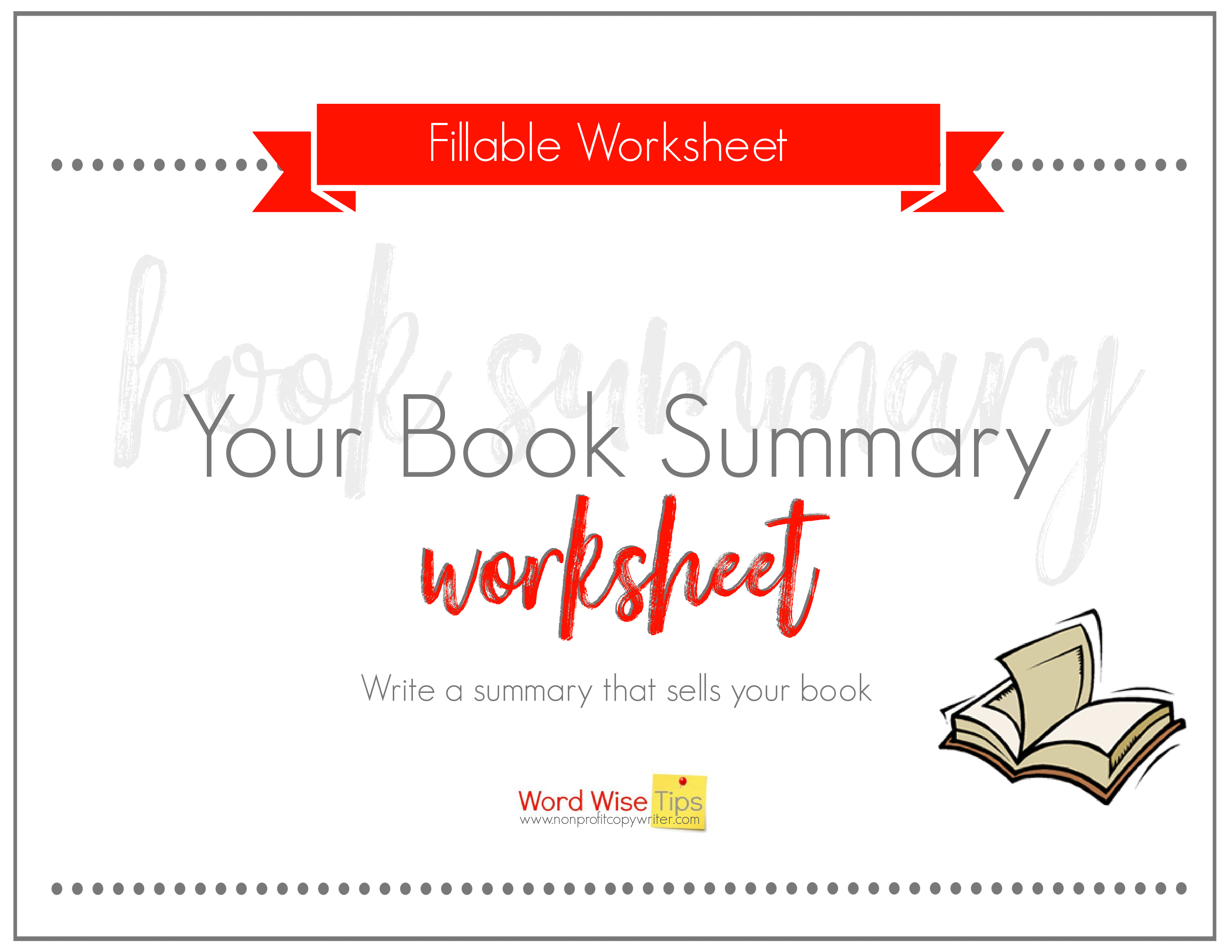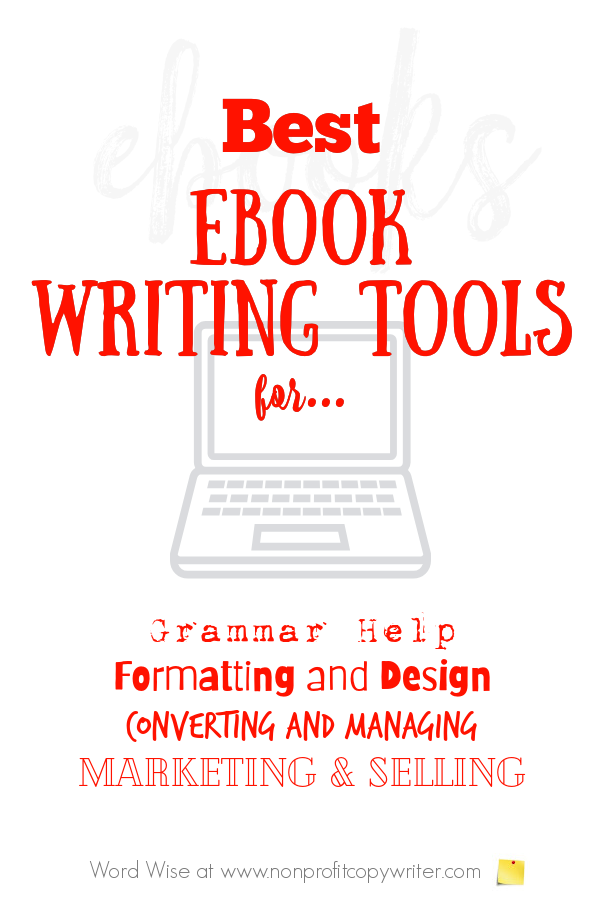Save Time: Get 5 Simple Writing Tips
you can put to use in 10 minutes
eBook Writing Software: The Lowdown on Tools for Writing eBooks
Award-winning writer Kathy Widenhouse has helped hundreds of nonprofits and writers produce successful content , with 750K+ views for her writing tutorials. She is the author of 9 books. See more of Kathy’s content here.
Updated 5.26.25
I wrote my first eBook a couple of decades ago. And I had no dedicated eBook writing software. I simply used MS Word.
I made the eBook cover myself, patterning it after an eBook by another writer I admired.
Once I was satisfied with the content, I spell checked and grammar checked several times. I chose a readable font as recommended by designers. I used Word to create a table of contents and page numbers. Then I saved the whole thing as a PDF.
Voila! I had an eBook to offer on my website as a free download.
These days, there are many eBook writing software options you can choose from. And there’s a host of tools for writing eBooks that you can use, too. These lists will get you started on your eBook writing journey.
Is there a special type of eBook writing software I should use?
If you want to create a simple downloadable eBook PDF, you can use the software on your computer. But if you have particular eBook writing goals, specialized eBook writing software can make the process easier and more efficient. Among them are …
1.Scrivener
Best for: long-form writing and organization. Scrivener is ideal for complex projects with a lot of research or notes, as you can organize all your materials in one place. It also supports exporting directly to eBook formats like ePub or Mobi. Scrivener has customizable writing templates and a split-screen view for working on multiple sections at once.
2. Reedsy Book Editor
Best for: collaborative writing and professional formatting. The Reedsy Book Editor is a free online tool that allows for clean, professional eBook formatting. It’s designed to help self-published authors, and it includes features for collaboration, making it great if you're working with an editor or designer. Extra plus is Reedsy's intuitive, simple interface for beginners.
3. Atticus
Best for: all-in-one writing and formatting. Atticus is relatively new but designed specifically for self-publishing authors. It combines writing, formatting, and exporting into one tool. It's a good alternative to Scrivener if you're looking for something easy to use with built-in eBook formatting features.
4. Google Docs
Best for: simple and collaborative writing. Yes, really – Google Docs is a great option for straightforward writing, especially if you need to collaborate with others. You can format and write your content here, then export it to Word or PDF and convert it later. Bonus: it’s free.
5. Vellum (Mac Only)
Best for: professional eBook formatting. Vellum is my choice when I create eBooks to sell on Kindle. It’s known for its high-quality eBook formatting options. I draft my manuscript in MS Word and then use Vellum for professional-looking design and publishing. It's particularly popular among authors who want polished books for Kindle and other eReaders.
6. Canva
Best for: visually engaging eBooks, like nature guides, cookbooks, or how-to books. Although it’s not writing software, Canva offers pre-made templates that you can use to customize your visuals. If you already use Canva for creating images, then you’ll reduce your learning curve by choosing it as your eBook writing software.
7. Kindle Create
Best for: Amazon Kindle formatting. Kindle Create is Amazon’s own tool for creating eBooks specifically for Kindle. It’s easy to use and offers templates that ensure your eBook meets Kindle’s formatting standards. This is a good option if you’re focusing on the Kindle marketplace.
8. Microsoft Word
Best for: Simplicity and familiarity. Word is often overlooked for eBook writing, but it’s a reliable option for drafting and formatting. Most eBook platforms (like Amazon Kindle and Smashwords) accept Word files, and you can use templates for eBook formatting
How should I choose eBook writing software for my project?
Which eBook writing software is for you? That depends. Here’s a summary guide to help you choose the best option for your eBook writing projects.
- Fiction writers: Scrivener – great for organizing complex plots, characters, and alternate storylines.
- Nonfiction writers: Atticus, Scrivener – ideal for organizing research and chapters, with professional formatting options.
- Technical writers: Google Docs or Microsoft Word – offers strong collaboration and formatting features for technical documents.
- Self-publishers: Vellum, Reedsy – simplifies the self-publishing process with export options for different platforms.
- Bloggers, content writers: Reedsy, Google Docs, Microsoft Word – lightweight tools for writing short content with easy formatting.
- Design-heavy writers: Vellum, Canva – allows precise image and design-heavy formatting.
- Academic writers: Scrivener or Microsoft Word – supports long-form research writing with citation and reference management tools.
- Freelance writers: Google Docs, Reedsy – quick, efficient writing and formatting for short eBooks or client projects.
Write a summary that sells your eBook with this fillable worksheet.
Are there additional eBook writing tools I should know about?
Just as there are plenty of helps for general writing beyond a paper and pencil (or computer), the same is true for writing eBooks.
Writing an eBook involves more than just writing the content – especially if you’re going to publish and market it yourself. Here are some additional tools for writing eBooks you should know about.
1. Grammarly
Best for: grammar and style checking. Grammarly is a powerful AI-based writing assistant that helps with grammar, punctuation, style, and tone. It's a useful tool for ensuring your eBook is polished and professional before publishing.
Plus, Grammarly interfaces with Google Docs, Microsoft Word, and Scrivener. And you don’t need to spend a fortune to use it – or anything, for that matter. You can sign up for the free version until you’re ready to move up to a paid subscription.
2. ProWritingAid
Best for: comprehensive editing and improving writing style. Like Grammarly, ProWritingAid offers grammar, punctuation, and tone checks. But the tool gives more detailed feedback on writing style, sentence structure, and readability – especially helpful if you want to refine your writing style. And it’s also available in both paid and free versions.
3. The Hemingway Editor
Best for: Simplifying and clarifying writing. The Hemingway Editor helps you write clearer, more concise sentences. It's great for tightening up your prose and ensuring your eBook is easy to read. Pros say it’s best for streamlining shorter pieces.
4. Evernote
Best for: Research and note organization. Evernote is ideal for gathering research, taking notes, and organizing ideas when planning your eBook. Use it to save articles and images, too. Evernote allows you to sync notes across devices and keep everything in one place.
5. FocusWriter
Best for: Distraction-free writing. If you’re easily distracted or need to get a project finished without being diverted, FocusWriter allows you to focus purely on writing. Its clean, full-screen interface boosts productivity. In FocusWriter, you can customize your writing environment with themes and fonts, set writing goals, use the built-in timer to track your writing sessions, and check your productivity statistics when you’re done.
6. Reedsy Marketplace
Best for: Finding professional services. Reedsy Marketplace connects authors with a vetted network of professional editors, designers, and marketers. This can be a useful resource when you need expert help for editing, formatting, or designing your eBook cover. The marketplace promises transparent pricing and direct communication with freelancers you are considering to hire for producing your eBook.
7. Plottr
Best for: Outlining and plotting fiction and non-fiction books. Plottr is a visual plotting tool that helps writers map out storylines and organize ideas for books and eBooks. It’s ideal for both fiction and non-fiction writers who want to create a detailed outline before writing. And if you struggle with organizing your ideas, Plottr provides templates for common writing structures – like a 3-act play, for instance.
8. Scribus
Best for: Desktop publishing and eBook design. Scribus is an open-source desktop publishing tool that offers professional layout and design features. It’s perfect for creating visually appealing eBooks, especially if they include images, diagrams, or design-heavy content. And it’s free.
9. Designrr
Best for: Turning blog posts or content into eBooks. Designrr allows you to quickly turn existing web pages, MS Word documents, videos, podcast or YouTube films into eBooks – and convert them to pdf, epub, Kindle or Flipbook. into eBooks. It automates the conversion process, so you can create eBooks from content you've already written with minimal effort.
10. Calibre
Best for: eBook management and conversion. Calibre is a free eBook management tool that lets you organize, convert, and export eBooks in various formats including ePub, Mobi, and PDF. It's especially useful if you're distributing your eBook across different platforms or formats. And you can use Calibre to organize and manage your eBook library.
11. BookFunnel
Best for: Delivering eBooks to readers and building an email list. BookFunnel is a service that helps you distribute your eBook files to readers in a secure and professional way.
It’s ideal for authors who want to offer free eBooks for email list-building or direct sales. BookFunnel delivers book files in all the major eBook formats and it integrates with the major email marketing services. I use it to deliver advance reader copies to my beta readers and book reviews. And it’s really inexpensive!
12. Canva
Best for: Creating eBook covers and visual elements. Canva offers easy-to-use tools for designing professional eBook covers, infographics, and visuals. It’s perfect for writers who want to create eye-catching designs without hiring a designer. Canva offers templates for eBook covers and interior content. You can export your eBook in PDF or image formats.
13. Gumroad
Best for: Selling eBooks directly. Gumroad allows you to sell your eBook directly to readers without the need for a separate eCommerce website. You can offer digital downloads and set your own prices, making it ideal for independent authors. Plus, Gumroad offers built-in analytics and customer management.
14. Leanpub
Best for: Writing and publishing in-progress eBooks. Leanpub allows authors to publish eBooks in-progress, letting readers buy the book before it's finished and get updates as you write. This is a good option if you want to gather feedback or generate income while you're still working on your eBook.
Which tools for writing eBooks do I need?
- For writing and grammar help: use Grammarly or Hemingway Editor.
- For formatting and design: use Canva, Vellum, or Scrivener.
- For converting and managing eBooks: use Calibre or Designrr
- For marketing and selling: use Gumroad, BookFunnel, and Leanpub
What do I need to know about choosing eBook writing tools?
There’s no shortage of eBook writing tools and eBook writing software.
Don’t get caught up in the technical mumbo-jumbo that can stand in the way of you getting your eBook out into the world. Remember the purpose of using a tool – it’s to help save you time and aggravation so you can focus on writing your eBook. Determine your needs, read the reviews, and make the best choice you can.
More on Writing eBooks
Get Started Writing eBooks: A Simple Tutorial ...
Should You Write a Free eBook? Take This Quiz to Find Out ...
How to Write an eBook Fast ...
Top Tip for Selling Your Book or eBook ...
E-Books Versus Print Books: Which Do Readers Prefer?
Writing an eBook? Get started by writing a short one ...
Why You Should Write an eBook: 5 Reasons to Consider It ...
Ebook Writing Tips: What’s the Best Book Word Count for eBooks?
Return from Best eBook Writing Software and Tools to
Nonprofit Copywriter home
As an Amazon Associate I earn from qualifying purchases.
Share This Page

Named to 2022 Writer's Digest list
BEST GENRE/NICHE WRITING WEBSITE


Stop Wasting Time!
Grab your exclusive FREE guide, "5 Simple Writing Tips You Can Put to Use in 10 Minutes or Less"














